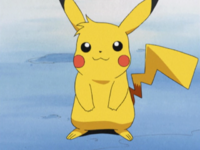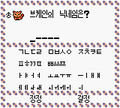Nickname: Difference between revisions
| Line 125: | Line 125: | ||
==In other languages== | ==In other languages== | ||
{{langtable|color=ddf|bordercolor=ccf<!-- | {{langtable|color=ddf|bordercolor=ccf<!-- | ||
|nl=Bijnaam | |||
|zh_cmn=綽號/绰号 ''{{tt|chuòhào|nickname}}''--> | |zh_cmn=綽號/绰号 ''{{tt|chuòhào|nickname}}''--> | ||
|de=Spitzname | |de=Spitzname | ||
|es=Mote | |es=Mote | ||
Revision as of 11:50, 8 May 2016

A nickname (Japanese: ニックネーム nickname) is a name given to a Pokémon by its Original Trainer. Every time a player catches, hatches, or is given a new Pokémon in a core series game, he or she is able to nickname the Pokémon to a maximum of twelve characters (ten prior to Generation VI). In addition to the games, nicknamed Pokémon have also been shown in the Pokémon anime and several manga series. Nicknames serve as a means of personalizing one's Pokémon, and distinguishing them from other individuals of the same species.
In the games
Players are given the option to nickname their Pokémon immediately after receiving them in any manner, such as receiving it from an NPC, hatching from an Egg, or capturing in a Poké Ball.
The only way to change the nickname is by taking the Pokémon to a Name Rater. Starting in Pokémon Black and White, whenever a player catches a Pokémon and decides to nickname it right afterwards, he or she may tap the Pokémon's sprite or model on the nickname screen to reset the nickname back to the generic name of the species of Pokémon.
Limits on nicknames
Nicknames have a maximum length of twelve characters, six in Japanese and Korean games. These characters are in turn limited by the character palette in the games. The characters available have expanded over the generations: in Generation I it was impossible to use numbers in nicknames, while later generations allowed both numbers and non-alpha-numeric symbols. In Generation I, it was possible to input a Pokémon's nickname as ten spaces, so when mentioned, no letters would appear. In subsequent generations, this would revert to the species name, even if the nickname is confirmed. Before Generation VI increased the character limit on nicknames, nicknames were limited to ten characters in international versions and five characters in the Japanese and Korean versions.
Traded Pokémon cannot be renamed unless they are returned to their original game; if it is impossible for the traded Pokémon to be returned, it cannot be renamed at all. If taken to a Name Rater, he will say the name is "perfect" and refuse to change it. This is to maintain the unique character given to the Pokémon by its Original Trainer. The game recognizes the trade when the OT number assigned to the Pokémon does not match the number on the save file. Very rarely will two players' numbers coincide; this is the only time when traded Pokémon may be renamed.
Pokémon traded from a Western Generation III game to a Japanese one will have its species name or nickname rendered in fullwidth characters, making it impossible to display the full name if it is longer than five characters.
In the 1.0 release of the English versions of Pokémon Ruby and Sapphire, the nickname flag of Japanese Pokémon is not set when they evolve so the Pokémon's species name will be adjusted accordingly (e.g.: Pichu's Japanese species name is ピチュー and the player nicknames it PICHU, then trades it to an English version and evolves it, causing its name to become PIKACHU). However, since the English games still render the name in the Japanese font, an evolved Japanese Pokémon that has a name longer than five characters will cause a crash while attempting to load the Pokémon List or send it out to battle (in the aforementioned case, the game will try to render it as PIKACHU instead of PIKACHU). This was fixed in the 1.1 release by adding an additional check to the name function used during evolution so that the Japanese Pokémon's name is not altered, effectively treating it as if it were a nickname. The European releases and subsequent Generation III games also have this check. In Generation IV and later games, this was altered again to allow non-nicknamed foreigner Pokémon to have their names changed to the corresponding regional species name upon evolution because the UI to display their names is able to accommodate the differences and apply the correct font.
In Pokémon Colosseum and Pokémon XD, a Shadow Pokémon cannot be nicknamed if it has not been purified. Immediately after this happens, the option will be given. Wild Pokémon caught from a Poké Spot in XD can be nicknamed as they are normally in the core series.
In Generations V and VI, the game will recognize when a nickname is profanity, and will not allow the player to use this as a nickname. However, Poké Transfer does not prevent Pokémon with vulgar nicknames from being transferred forward. Instead it will delete the nickname and revert it to the default Pokémon's name.
Outcomes of nicknaming
Nicknaming Pokémon rarely has any effect on gameplay, and is simply an element of customization that players are free to use or ignore. The only games in which nicknamed Pokémon are treated differently are Pokémon Stadium and Pokémon Stadium 2. In these games, when nicknamed Pokémon are transferred from a core series game they have a chance of being alternately colored. This coloration is not the same as being a Shiny Pokémon. This feature has not been included in any later games.
Sometimes, in Pokémon Ruby, Sapphire, and Emerald, when the player gives a previously caught Pokémon a nickname at the Name Rater's house, the Hoenn TV network will report the nickname chosen. The host will always commend the player on his or her choice of name, even if the player decides to leave the Pokémon's name as it was. When records have been mixed with another save file, the television network may report on the other Trainer's choice of nicknames.
With Generation IV's Global Trade System, some naming issues may arise. The main issues are receiving Pokémon with nicknames in a foreign language and receiving Pokémon whose nicknames are threatening, inappropriate, racist, vulgar or pointless (for example, a name consisting of random characters). As the chances of matching both the Trainer ID and Secret ID are near impossible, these nicknames cannot be changed.
In Pokémon Black 2 and White 2, there is a Medal awarded for having nicknamed Pokémon 10 times.
Pokémon with nicknames deemed "inappropriate" may show up in Battle Videos as Pokémon without a nickname: a Staraptor named inappropriately would have its nickname reverted to "STARAPTOR". It is unknown if this censoring is automatic or done on a case-by-case basis by Nintendo employees.
In Pokémon Omega Ruby and Alpha Sapphire, a BuzzNav program called The Name Rater Show tells a Pokémon's fortune based upon the first letter of its nickname.
Non-player characters and nicknames
NPC-nicknamed Pokémon are somewhat rare, and almost never encountered in battles. However, all Pokémon acquired from in-game trades have nicknames, as well as all Pokémon used by NPC Coordinators prior to Generation VI. Likely to emphasize the color change effect, most of the Pokémon encountered in Pokémon Stadium also have nicknames. Team Rocket's nicknamed Pokémon have numbers in their nicknames (which was impossible on hand-held games at the time).
In Black 2 and White 2, due to NPC and player switching one of their Pokémon in PWT's Mix Tournament, it is possible to fight a nicknamed Pokémon if the Pokémon chosen by opponent had a nickname.
List of characters
Generation I
Generation II
Generation III
Pokémon Colosseum
Pokémon XD
Generation IV
Generation V
In spin-off games
Pokémon Channel
In Pokémon Channel, the player has the option to nickname his or her companion, Pikachu, once they become familiar enough with each other.
Pokémon Mystery Dungeon series
In the Pokémon Mystery Dungeon series, the player has the option to name their player, which is defaulted to the Pokémon they transformed into. They also have the option of nicknaming any Pokémon that joins their team. Unlike in the core games, however, nicknames cannot be changed, as there is no service akin to the Name Rater in the series.
In the anime

As in the games, nicknaming Pokémon is optional. It is very seldom that main characters have nicknamed their Pokémon, leaving nicknaming largely unique to one-time characters. Often, these characters possess more than one of a species of Pokémon, and nicknaming is to provide distinction, such as in Get Along, Little Pokémon. At other times, the nicknames help to drive the plot, as in Wherefore Art Thou, Pokémon.
The only main characters to possess a nicknamed Pokémon are Misty, who has a Luvdisc known as Caserin, and James, who has a Growlithe called Growlie. Ritchie, a recurring character, also uses nicknames. Marina from The Legend of Thunder! and Mairin from Mega Evolution Special I also have nicknamed Pokémon.
Nicknamed Pokémon still say their species name as their cry in the anime instead of their nickname. For example, Sparky still says "Pikachu" and variants of it.
Bonnie, who is a current travelling companion of Ash, nicknamed a Zygarde Core, Squishy in the XY series.
In the manga
In the Pokémon Adventures manga
Some Pokémon manga series use nicknames as a way to differentiate and individualize Pokémon characters. At least Two Pokédex holders in each region names their Pokémon. Quite often, the Trainer will nickname his or her Pokémon with a particular pattern, such as how Crys ends most of her Pokémon's nicknames with the "e" sound, and Gold ends most of his Pokémon's names with "bo". Brock's six Geodude are each named after a number, from "Geoone" to "Geosix".
Unlike in the games, nicknames can be changed by other trainers. Examples of this include Mr. Stone's Castform being named Fofo by Ruby, Pokémon that are given away such as Gurkinn's Gengar to Lasma and Grace's Rhyhorn to Saisai by X and Y respectively.
In other languages
| ||||||||||||||||||||||||
| Pokémon training | |
|---|---|
| Catching • Nicknaming • Battling • Evolving • Trading • Breeding • Releasing | |





















